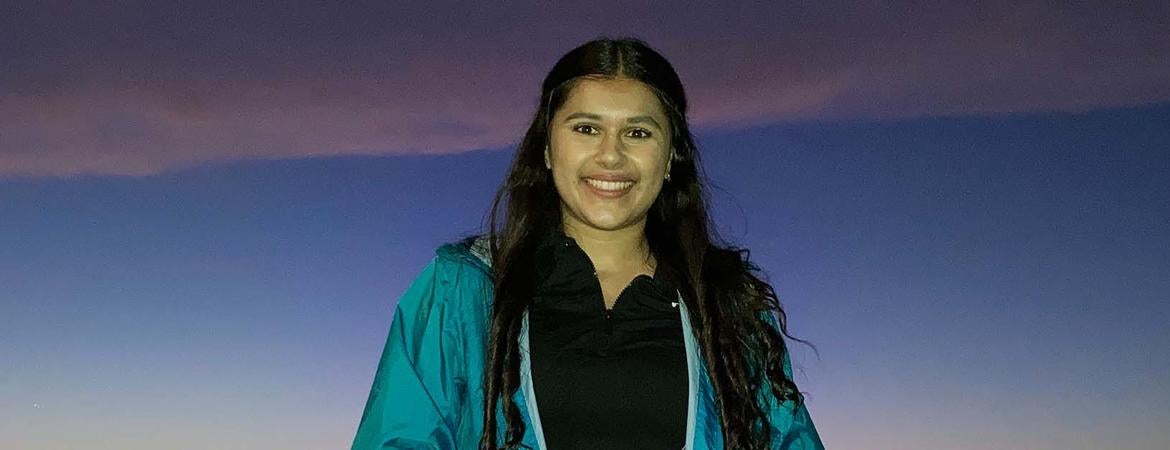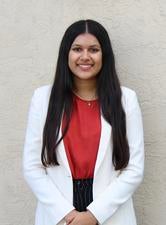
Name: Radhika Amin
Major: Second year Neuroscience major
Hometown: Fremont, CA
As a student, you lived on campus, you were involved in a variety of student groups, volunteered with a number of organizations, and conducted research. Please share some of the highlights during your time at UCR. How has that changed during the campus closure?
I was fortunate to meet so many driven and passionate students and faculty during my time on campus. I could learn so many new things no matter where I was or what I was doing. When I joined the UCR Brain Game Center in the fall, I had no prior research experience, but the team was willing to put in the time to teach me the research methods I needed to succeed.
By the end of freshman year, I helped conduct a year long project on adaptive algorithms in memory training and presented findings at two undergraduate conferences. Being a part of this supportive community was conducive to my growth as an undergraduate student. The switch to remote learning was challenging, as many other students likely felt as well, because we had to quickly adjust to a new environment. I was worried that I may find it difficult to continue my involvement on campus. Fortunately, many of my extracurricular activities were able to transition to a virtual platform, so I found ways to stay connected.
Tell us more about the research you conducted with Professor Aaron Seitz and the UCR School of Medicine on stroke research? How did you become interested in this field of study?
I initially was drawn to research at the Brain Game Center, because of my experiences with concussions and head injuries from when I used to play soccer. I wanted to understand the relationship between brain structure and cognitive functioning, especially in those affected by traumatic brain injuries or those who are cognitively impaired. Therefore, after hearing about the stroke project from Professor Seitz, I was immediately interested.
We are working on using existing technology developed at the Brain Game Center to create an electronic-based neuropsychological battery, which is basically a group of tests that can assess multiple cognitive domains such as executive function, visuospatial abilities, etc. We are working on designing the battery so that it can accurately assess the cognitive abilities of stroke patients in the long term. We have also been working closely with doctors at the UCR School of Medicine in piloting the battery towards our target population this year. In light of the pandemic, there is an increasing need for such remotely administered tests because expert examiners that were once able to enter hospitals and assess patients may no longer be able to do so. I strongly believe that patients deserve the same standard of health care no matter the situation which is why I feel so passionate about this area of research.
You had the opportunity to participate in the RISE program last summer. Describe RISE and your experience with the RISE program.
The RISE program this summer was an incredible opportunity for my personal development. I am grateful for the support I have received throughout the program from program leaders, peer mentors, donors, and our research team. Over the program, I have gained a greater understanding of the interdisciplinary studies of my peers and the research that I am conducting as well. I collaborated with experts at the Brain Game Center and the UCR School of Medicine, while I drafted several proposals of the stroke battery. There are many tests that we want to include in the battery, but we are limited because we don’t want the entire assessment to be too long. Part of my job was to help determine what was important and what wasn’t important which was challenging. Overall, the experience has taught me how being patient and steadfast is crucial for continuing progress within any research field.
Any advice for prospective students?
As an undergraduate student, I learned the importance of putting my efforts towards activities that I am passionate about. I advise prospective students to spend time to figure out what they are really interested in and how that could relate to what they intend to do in the future. I am grateful to be a part of a team that has put in so much effort to help me learn, so I hope that future students can also find opportunities where they have this same ability to learn in their field of interest and grow as an undergraduate.
What are your plans for the future?
While RISE has helped me solidify what I would like to do in the future, it has also shown me the vast career opportunities within various fields of research. I plan to pursue a graduate degree in a field of education and health research. I am unsure of which specific career I would like to have, but I am excited to see what the future holds.
